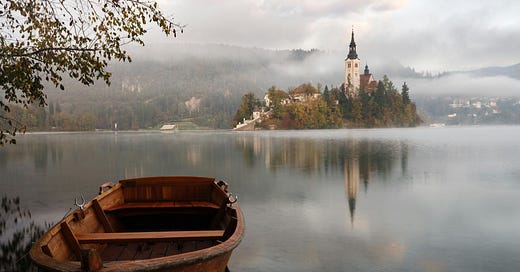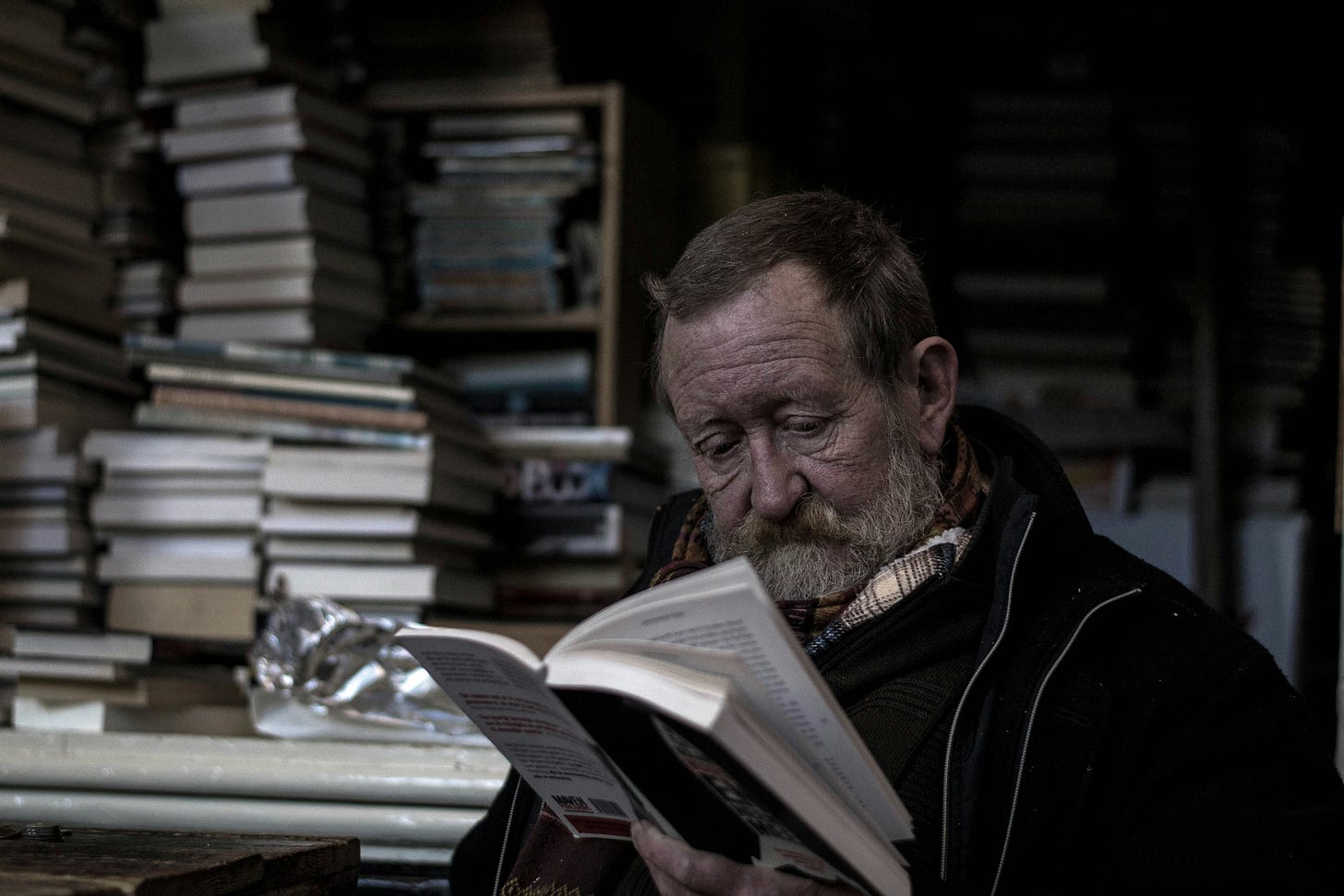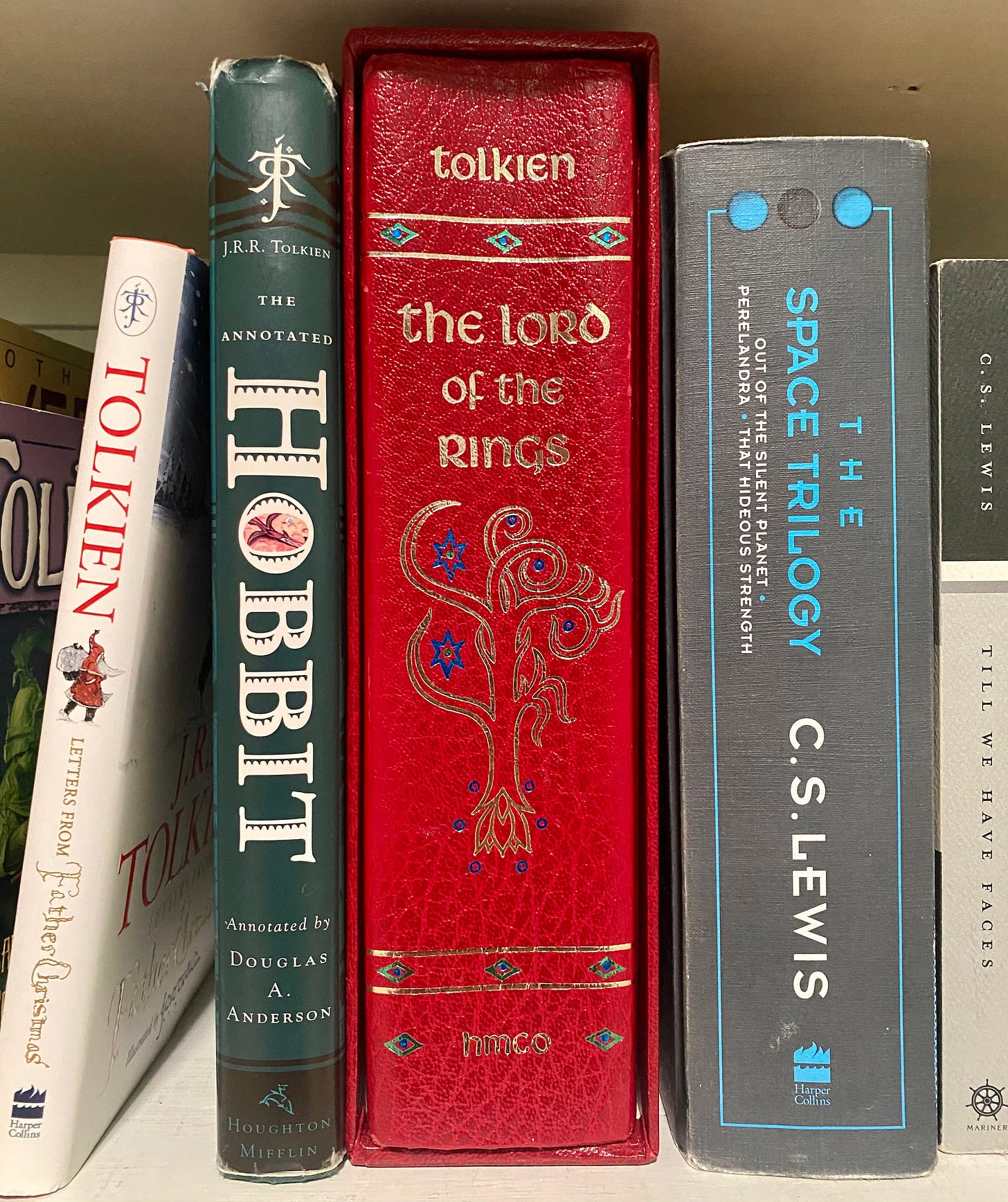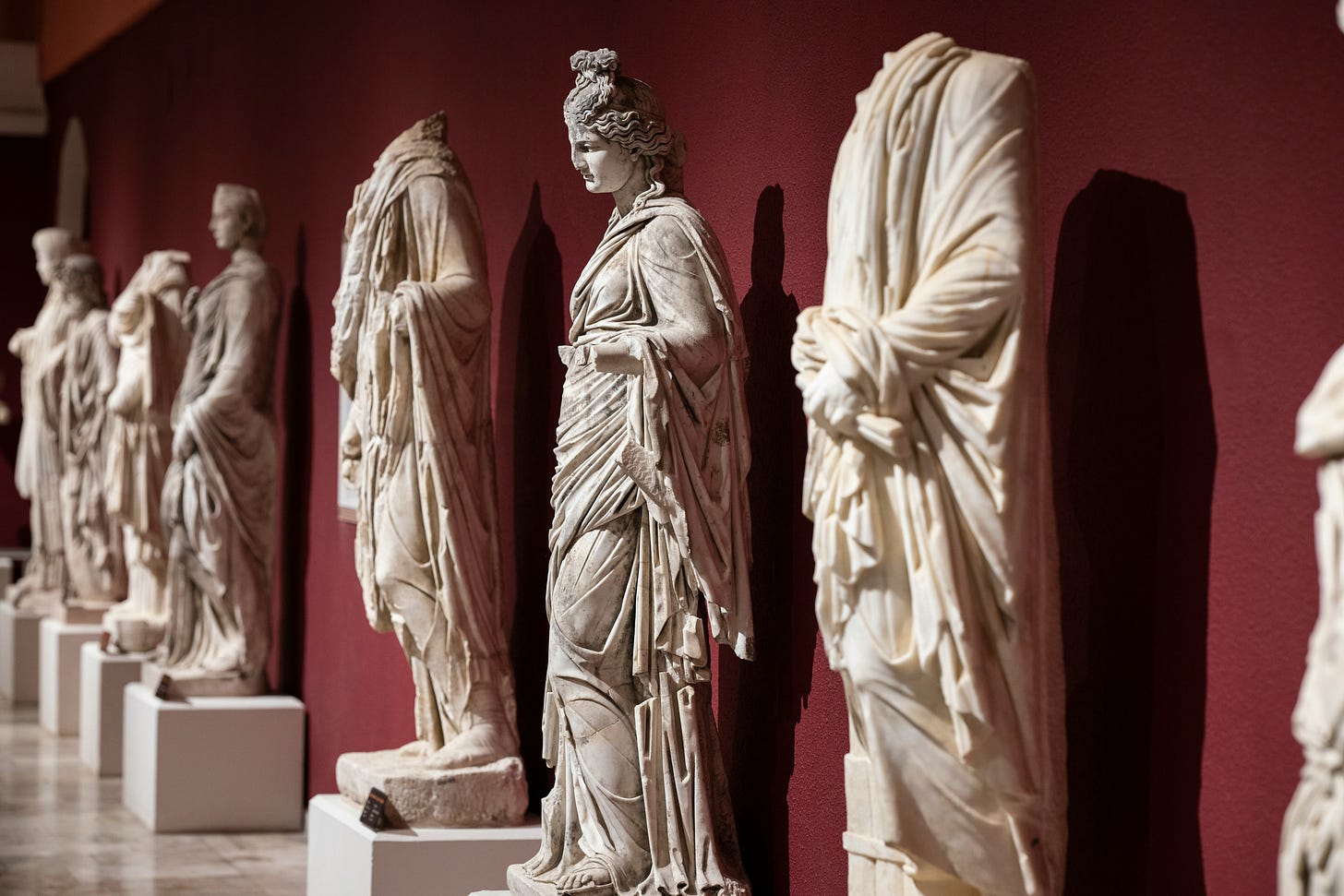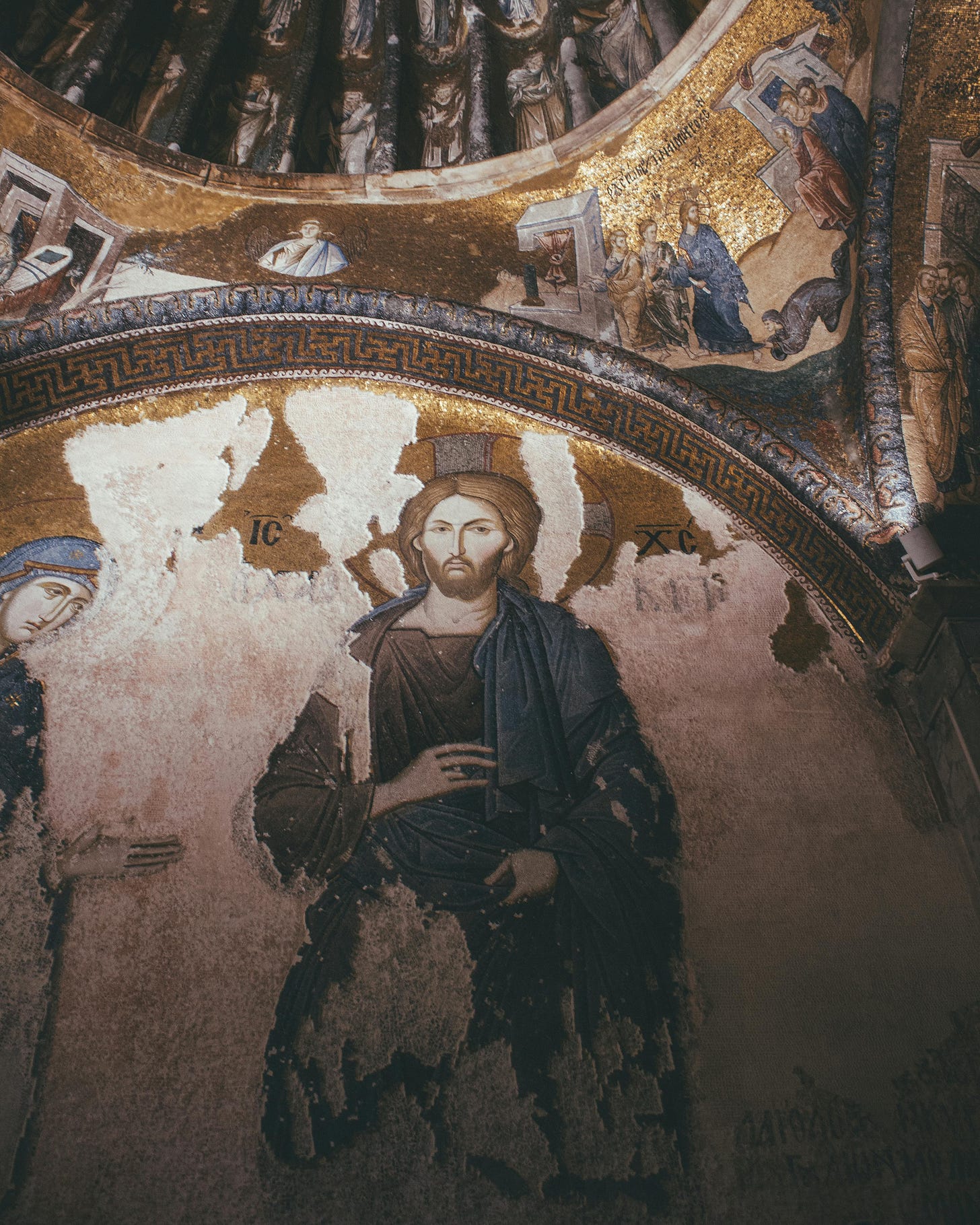The Sun's Reflection in Water
How St. Basil's Address to Young Men Guides Us to Discern Good Fantasy
Why Waste Time on Speculative Fiction?
What do you suppose is the number one question I’m asked as a fantasy author who is also an Orthodox Christian deacon?
It's something like this: How can you, as a Christian, allow yourself to engage in reading and writing fantasy that involves magic? Isn’t this obviously evil? Isn’t it a bad idea for Christians to spend their time in fantastical worlds?
If you’ve ever heard some form of this objection (or have wondered about it yourself), I hope to dispel it for you by the end of this article. In fact, I hope to give you a definitive answer, so you can contemplate it occasionally, and maybe even pull it out for others whenever the occasion arises.
It’s absolutely true that it’s hard to find a satisfactory answer to this question. And no, it’s not as simple as saying, “The Church Fathers say that fantasy is evil and that’s that.” Various answers have been suggested, some better than others. Sometimes we even hear an answer like this: “If I’m not personally indulging in black magic, just leave me alone. My reading is a matter of personal taste.”
But even in this rebuttal, we’re open to the criticism that we’re at best wasting our time with something inconsequential. The question then shifts: is speculative fiction really important enough to spend time reading and writing? Why are you wasting time with all this wizard stuff when you could be reading serious literature like the classics?
To answer this, all we have to do is remind people that there actually are classics of literature that are speculative, such as Mary Shelley’s Frankenstein.
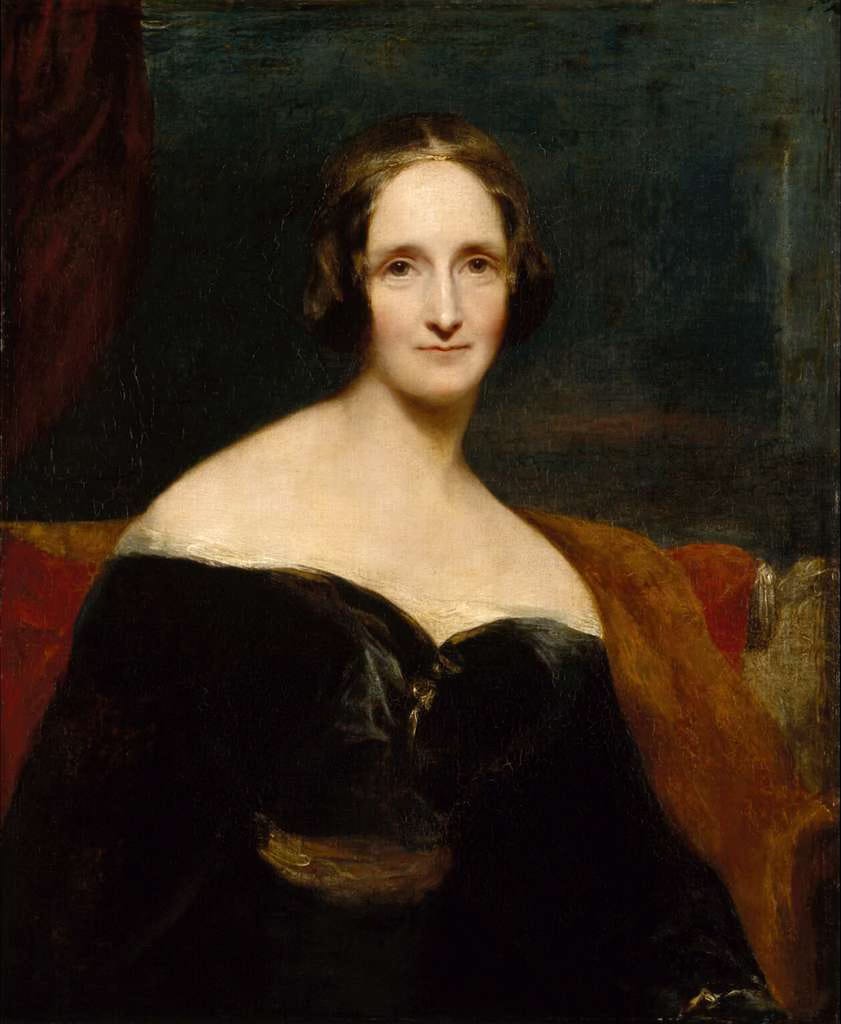
But things are not as simple as they seem.
There is No Center Stage for Culture-Defining Stories
The problem is much deeper than even I thought before I started to dig deeply into this question. Recently, I gave a talk at an assembly of what I thought were friendly fellow Christians, most of whom were some form of writer or content creator or podcaster. The topic of my speech was “Why Becoming a Storyteller May Be the Most Important Thing You Do with Your Life.” (You may notice that exaggerations in my speech titles are typical. I am Russian, after all!) .
I thought everyone would agree with my premise, which was this: there is no such thing as a center stage or public square where people congregate to talk about matters of cultural import.
It used to be that every time Stephen King published a book, everybody would buy it and talk about it. It used to be that if there was a blockbuster film series, like Star Wars, everybody would be talking about it. There would be a cultural moment. Certainly when the first Star Wars came out, it was an culture-altering event that we're still feeling the effects of today.
But the internet has done a weird thing. It's gotten rid of center stage and public square both. There's really no such thing as a culture-defining story, even though people desperately keep trying to make one up. Rings of Power tried very hard. (If you want my opinion on that, you can listen right here.)
I thought it was a pretty obvious point that there is no center stage. (I’m not the first person to make this point, and there are many people, much more intelligent than I, who have written about this). As authors, this means we shouldn’t try to pander to the apparent desires of a common culture. Instead, we should focus intently on our craft and go deep inside the tradition of storytelling until things change culturally. At the same time, I believe we should lament the loss of a common inherited culture, not least because it gave us writers like Tolkien and Lewis.
Should We Lament the End of a Common Inherited Culture?
I would have thought that this line of argumentation would have been okay in a room full of Orthodox people. As soon as I ended my talk, however, a rather prominent person in the audience got up, taking extreme offense at my entire line of argumentation, and letting me know in no uncertain terms that I am nothing short of an ethnocentrist and an elitist for suggesting that the end of a common culture, especially a common inherited culture of the West, is something that should be lamented. This person’s point? That a massive diversity of formerly marginalized voices is far preferable to an inherited common culture, especially the culture of Christendom.
Creating a stage for marginalized voices is certainly a position that I am ready to embrace. But to vilify the idea of a single common culture that lifts everyone up? I thought that's what culturally-inherited Christianity (and there is no other kind) was supposed to be.
Culture Wars and Polarized Storytelling
This incident showed me that there is a deep divide even within the safe confines of people we thought were our own family. This divide is one that is not simply here or there–it's everywhere.
Frankly, I'm not sure that I fully understood why I got this person so upset. But recently I read an article titled “Machine Antidote 101: How to Apprentice a Human” in a wonderful Substack called the School of the Unconformed (go subscribe if you haven’t already!) In this article, writers
and name the two polarized positions involved in what most people are calling “the culture war.”The Given and the Choosers
(A quick note: I'm not going to be incendiary here. I'm not going to spend a lot of time on the culture war topic. But I will definitely try to illuminate the fact that no matter what we do, no matter who we are, no matter where we are, there are very deep divisions, and those divisions go to the heart of what we read and how we read. If we don't understand those divisions – divisions that sometimes exist even inside ourselves – we won't be able to fully understand what it is that St. Basil the Great has to tell us in his wonderful address to young men, which is the core of what I want to talk about today.)
Peco talks about how the divides we see in worldview, and in storytelling in particular, mirror the divides we see in politics, religion, and things like reactions to the pandemic. Ruth names these two camps “the given” and “the choosers.” (Peco actually calls this group “the chosen,” but that sounds too much like a certain not very good TV show, so I'm going to call them “the choosers”.)
The given are those who see themselves as inheritors of a tradition and try to do everything in their lives to conform to that received tradition, because it is in the preservation of the beauty and good that we have received from our fathers that we can move forward and perhaps keep creating and keep living in a beautiful way.
The other side is the choosers. The choosers are those who believe that received traditions are inherently oppressive, so it's better to move away from them. They do say that if you want to choose to be a recipient of a tradition, go ahead, but don't try to tell others that having a received tradition (a canon) from those who have come before you is somehow better than simply choosing your own world and creating your own reality.
This second worldview is a very popular way of living right now, especially for young people. And its popularity is not surprising because it's very empowering: initially, it does seem like you could pretty much do anything you want with yourself. And the vistas are limitless.
The “Heresy” of Cultivating Personal Taste
But there’s a problem with this worldview. (Actually, there are many problems, but I’m going to focus on one in particular because it’s relevant to St. Basil’s address.) To summarize this problem, I’m going to quote from
's recent book Denying My Existence. Here's what she says about people who believe that the only way you can live and read is to be one of the choosers:It seems to me that those who experience the world this way simply don’t have an inward sense of being a complete person, except inasmuch as this is scaffolded from outside….A few years back I wrote a long essay in Palladium about how this reflects a worldview that rejects shared meanings as oppressive by definition, in favour of radical self-creation. But the problem with insisting that you are the sole arbiter of yourself is that self-creation means nothing until someone else agrees with the truth of whatever you’ve created.
from Denying my existence by Mary Harrington
So you see, there's a kind of crazy absence of logic in this kind of approach. It is reflected in the world of books when people insist that personal taste in reading is such a sacred choice that even to suggest that someone's personal taste might need cultivation, adjustment, [pick your own toxic word] is heresy.
Recently, I saw an extreme form of this in a book a read recently, a popular guide for writers that proposes that there is such a thing as a “universal fantasy” that all effective (read: financially successful) authors use.
“Moral to Taste”
But the really scary part about this book (which was marketed as a happy, light book for writers that had absolutely no judgment in it) is a section toward the end labeled “Moral to Taste.”
The author of the book says that she tends to get questions about shameful universal fantasies. These are the fantasies that some authors and readers will shame you about. Some currently hot market examples of “seemingly” shameful fantasies that attract outraged one star reviews include alien domination romance, daddy/little girl romance, and academy reverse harem bully romance. If this is getting too technical for some of you, imagine these situations: getting treated like a little girl by a daddy figure as a prelude to a sexual tryst, becoming the object of obsession by a clique of high school boys, etc… These are actual trends that attract readers.
You don't believe me? A few years ago, I was at a book convention in New York City. This was not a fun conference where people dress up and have a good time. It was a dull business conference for publishers and distributors. So I was very surprised when suddenly, in the middle of one of these extremely dull days, there was an absolutely earth-shattering shriek in the middle of this massive convention.
We all turned to see what was happening: apparently one of the shirtless cover models for a romance novel had appeared, and people were shrieking in excitement to go take pictures with the model.
Where Does Freedom of Taste Lead?
Now I'm not saying this to judge anyone or to tout my own moral superiority. My point here is that there is, in our current cultural moment, a call to an apparent freedom to one's reading habits that is supposed to release you from all of the repressions of canon or church or received tradition. But what this “freedom” is doing is pushing people into things like little/big bully romances.
The authors of this kind of fiction will tell you that reading is a safe place for you to enact those fantasies you’re embarrassed to talk about in public. It’s a safe place for you to get those impulses out of your system and not harm anyone.
If I suggest that reading these things is somehow immoral or dangerous, I get labeled as teh one who is actually dangerous because I’m not allowing people to live out their dark fantasies in a safe place.
What St. Basil the Great Says about Reading
St. Basil does not agree. In his “Address to Young Men,” he says:
To begin with the poets, since their writings are of all degrees of excellence, you should not study all of their poems without omitting a single word. When they recount the words and deeds of good men, you should both love and imitate them, earnestly emulating such conduct. But when they portray base conduct, you must flee from them and stop up your ears, as Odysseus is said to have fled past the song of the sirens, for familiarity with evil writings paves the way for evil deeds.
Therefore the soul must be guarded with great care, lest through our love for letters it receive some contamination unawares, as men drink in poison with honey. We shall not praise the poets when they scoff and rail, when they represent fornicators and winebibbers, when they define blissfulness by groaning tables and wanton songs. Least of all shall we listen to them when they tell us of their gods, and especially when they represent them as being many, and not at one among themselves.
We can take some concrete lessons about how to approach the act of reading from this wonderful text.
But let me first emphasize what St. Basil is saying: He's saying that when we read about virtue, the power of literature itself pushes us to emulation. And when we read about vice, we are passively led to imitate what we read about without much effort on our part (because reading is in some sense a passive state). “Familiarity with evil writings paves the way for evil deeds.” So you see, it's actually easier to do ill from reading than it is to do good.
This leads us to the first of four rules from St. Basil in cultivating our discernment in the reading of profane literature, especially fantasy, science fiction, and horror.
Four Rules on Cultivating Taste from St. Basil the Great
1. Reading Does Affect How We Live
Rule number one: Reading does affect how we live. We know this because the Gospel tells us and the saints tell us. And now that science is starting to catch up and tell us the same thing, we should really start paying attention.
There's a series of very interesting studies being done on the effects of reading on the brain. One recent test measured the activity of the brain in a reading state and in a post-reading state by scanning people's brains in an MRI machine. Now, the people in the study were not reading some great work of literature. They were reading a trashy thriller about Pompeii, but it was exactly the kind of book that was calculated to get you involved in the book and not distracted.
So the study participants were scanned in a pre-reading state, scanned during reading, and then scanned five days later. Lo and behold, their brains were still showing that they were still “reading” five days later. As you can imagine, neurobiologists are making all kinds of interesting deductions from this!
My point is that reading affects you at a very deep level, whether you realize it or not, and even “the science” is catching up to show this.
Reading has a deep, even profound effect on the body. And since we are not simply bodies with souls, but enmeshed body-soul creatures, it’s apparent that St. Basil knew exactly what he was talking about when he told us that yes, reading does affect how you live.
But the choosing types are likely to raise another objection: How does my choosing to read something unpleasant, possibly even pornographic, affect you? It's just a pleasant diversion. Why do you care so much?
Well, St. Basil answers this too:
"We Christians, young men, hold that this human life is not a supremely precious thing, nor do we recognize anything as unconditionally a blessing which benefits us in this life only"
This leads us to rule number two.
2. Entertainment of the body is not a positive end in and of itself.
That's a hard rule. It's difficult to hear. And we will nuance this rule a bit at the end of the article. But for now, we're faced with a different problem.
We readers of speculative fiction don't have the bastion of a received tradition to hide behind. The only real received tradition that we have is Tolkien and Lewis and some of the classics that can fit into the genre. Most of the stuff written in these genres is really new.
There is no universal mechanism of determining a received tradition, no way to know yet what we should or shouldn't read, because a canon takes time to develop. Sometimes it takes centuries for stories to cement themselves in the collective imagination of a people.
Because of this, we are forced to take the path of the “choosers”, not the “given” and decide whether or not we like a book on our own rather than adhering to a received tradition. Since we are forced into this position and have to try out a lot of books to see if they are worthy of our attention, we need all the more to remember rule number one, that reading does affect how we live. St. Basil, again:
Now this is my counsel, that you should not unqualifiedly give over your minds to these men, as a ship is surrendered to the rudder, to follow whither they list, but that, while receiving whatever of value they have to offer, you yet recognize what it is wise to ignore. Accordingly, from this point on I shall take up and discuss the pagan writings, and how we are to discriminate among them.
Notice that St. Basil does not suggest that we should categorically renounce certain genres. Rather, he encourages the cultivation of discernment.
Remember, St. Basil is addressing young men. These young men are not well formed in the faith yet. They're not mature. In fact, earlier in his address, St. Basil even refuses to talk to them about the spiritual life. And yet the door to reading seems to be wide open to them. And here's why.
Into the life eternal the Holy Scriptures lead us, which teach us through divine words. But so long as our immaturity forbids our understanding their deep thought, we exercise our spiritual perceptions upon profane writings, which are not altogether different, and in which we perceive the truth as it were in shadows and in mirrors.
What an astounding sentence: “the profane writings, which are not altogether different” than the sacred ones!
Thus we imitate those who perform the exercises of military practice, for they acquire skill in gymnastics and in dancing, and then in battle reap the reward of their training.
In other words, they bonk their heads a lot, and it hurts. And it's fine, because through that process, they become stronger.
We must needs believe that the greatest of all battles lies before us, in preparation for which we must do and suffer all things to gain power. Consequently we must be conversant with poets, with historians, with orators, indeed with all men who may further our soul's salvation. Just as dyers prepare the cloth before they apply the dye, be it purple or any other color, so indeed must we also, if we would preserve indelible the idea of the true virtue, become first initiated in the pagan lore, then at length give special heed to the sacred and divine teachings, even as we first accustom ourselves to the sun's reflection in the water, and then become able to turn our eyes upon the very sun itself.
Life is serious business. We should not deny ourselves all the tools that we need to live well. I am sure there are many readers of this Substack who came either to faith in Christ, or to a deeper understanding of their existing faith, through the reading of this kind of fiction. I have met too many people with such stories to deny this.
There's another subtle point here that I want to bring to your attention. Basil says, “profane writings are not altogether different from the sacred ones, in which we perceive the truth as it were in shadows and in mirrors.”
What is he talking about? Is there not that much difference between sacred and profane writing? Have we been lied to by our priests? What is it about the profane writings that can lead St. Basil, one of the greatest saints we've ever had, to say such a thing? Well, we'll get back to St. Basil in a second.
But first, I want to talk about Tolkien. This is what he talks about in his wonderful essay “On Fairy Stories,” in which he says that the eucatastrophe of history (eucatastrophe being that term that describes the sudden and unexpected ending at the end of a fantasy or a fairy tale) is something that is made all the more real by the fact that it has already happened in real life with Christ, who came down, who enacted the life of the hero, who physically went through the eucatastrophe of death and resurrection. And so the stories that echo that real event in history have a tremendous power to transform us because Christ, as Tolkien says, is the “God of angels and men and elves.”
I think we've all heard aspects of his argument before, but look deeper: the pattern for nearly all good storytelling is found in Scripture.
The myths of ancient peoples are imitations of the pattern of Genesis. All the other ancient myths are the repetition of this pattern. The archetypal rhythms of the way fairy tales work sound just like the Noah story. Look at the cadences. Look at how the language works. Look at how the characters interact. It's entirely like a fairy tale, except it's history.
Let’s look beyond fairy tales and myths: The psychological complexities of characters' motivations in 19th century literature find their archetypes in the account of David and Saul. Read the story of David and Saul as a story, and consider how often we get into the minds of individual characters.
That simply doesn't happen in any other literature from that time period. Nobody wrote like that. It's as if the inspired writers of Scripture knew that someday there would be this movement in the 19th century in England and Russia where tremendous novelists like Dostoevsky moved worlds with their words. And to make them even more effective, the writers of Scripture gave us the model.
Read Scripture again. You'll see it's truly amazing.
And guess what? I’m not the first to make this point. This is a point made by fantastic Old Testament scholar named Robert Alter, who's not even a Christian (see Alter’s wonderful book “The Art of Biblical Narrative,” and forgive him his usage of the word “fiction” when talking about sacred Scripture).
So as we read the profane stories and writings, we are led by them to their prototypes, just as icons lead us to venerate the saints they represent.
St. Basil continues:
It is not without advantage for it to embrace the pagan wisdom, as also leaves offer shelter to the fruit, and an appearance not untimely. That Moses, whose name is a synonym for wisdom, severely trained his mind in the learning of the Egyptians, and thus became able to appreciate their deity. Similarly, in later days, the wise Daniel is said to have studied the lore of the Chaldaeans while in Babylon, and after that to have taken up the sacred teachings.
This leads us to the third rule of how to discern in our reading good fantasy, or good storytelling in general.
3. Choose Stories that Reflect the Patterns of Scripture, but also, with care, Choose Stories that Contrast with the Patterns of Scripture
The Lord of the Rings is an obvious example. It is a hero's journey par excellence, so is The Hobbit. As you read these tales, you are astounded sometimes by the depth of the storytelling that seems to echo a kind of unwritten Scripture.
But look at something completely different, something like the world of Warhammer 40K. If there were to exist a world that only had a dark deity and everything were created by that dark deity, Warhammer is exactly the kind of world that would result from it. And it leaves you with no doubt about which kind of world you would prefer to live in. You can’t possibly read these stories and think, “this is probably the way the world is.” That’s exactly how I felt when I read No Country for Old Men by Cormac McCarthy, which seems to be a damning indictment of American Christianity but to me is the greatest proof that God must exist. Read it. It’s a fantastic book.
St. Basil:
Since we must needs attain to the life to come through virtue, our attention is to be chiefly fastened upon those many passages from the poets, from the historians, and especially from the philosophers, in which virtue itself is praised. For it is of no small advantage that virtue become a habit with a youth, for the lessons of youth make a deep impression.
And so we come to rule number four.
4. The Chief Reason to Read is to Train Ourselves to Become Virtuous
But wait – don’t we read to have fun and enjoy stories? If the point of reading is to become virtuous, why don’t we limit ourselves to the philosophers? Why do we need to read fiction? It’s just a waste of time, right?
And yet, St. Basil says:
He, who by his works exemplifies the wisdom which with others is a matter of theory alone, 'breathes; all others flutter about like shadows.' ... I think it is as if a painter should represent some marvel of manly beauty, and the subject should actually be such a man as the artist pictures on the canvas.
This is a wonderful phrase, albeit a little complicated. St. Basil is suggesting that the rhythms of storytelling are so powerful that it is almost like a sculptor making a sculpture that comes to life. Stories, specifically, not philosophical works.
Christ knew this. What was his primary, most effective way of teaching? Parables. Any exploration of the subject of imaginative storytelling within the context of the spiritual life must consider the parables. Jesus often did turn to his listeners with direct instruction, the sermon on the mount being a good example, but His parables are an entirely different method of telling, which left a great deal more space for imagination, fantasy, and personal creative interpretation.
In the parables of Jesus, we see not only a teacher of morality, but a poet who envelops HIs thoughts in flexible, multifunctional poetic forms which presuppose a multilayered reception by means of the heart. In other words, Christ creates a secondary world, to use Tolkien’s language.
And the saints continue this tradition. Have you heard the wonderful hymnography about the sinful woman who comes to wash the feet of Christ? There is an incredible corpus of works that delve into her personal motivations that create an entirely new character–the merchant who sells her the myrrh. He is not in Scripture, yet the saints give him a personality. Then there’s the servant at the door who doesn’t want to let her in. He’s also not in the Scriptures, yet the saints give him a personality too. This is an entire story that is overlaid on top of the Gospel account that allows us to enter into her internal life and hear her own thoughts. This was written in the fourth or fifth century– the saints understood this a long time ago.
(For more on this topic, please buy and read She Who Loved Much by Fr. Kevin Kalish)
In a sense, Christ and the saints both created secondary worlds for us to inhabit imaginatively so that we may enter into empathetic connection with the characters of Scripture. In fact, every parable offers a personal read. It demands one. Its meaning reveals itself to individuals. It is informed by received tradition, yet you can only receive it fully when you enter the story individually, based on your own life circumstances and context.
Moreover, the meaning of the parable can be revealed differently in different readings for the same person. This is true of entire peoples, nations, and generations. Based on the level of his own spiritual development, a person may understand the meaning of each parable differently, and there’s nothing wrong with that. Entire groups of people may interpret their significance based on their cultural context, challenges of a particular time, and many other factors.
To summarize, I quote Metropolitan Hilarion Alfeyev, a theologian of our time:
Jesus used the parable, a storytelling form, specifically because it is the most capable of awakening the heart to the content of his call: a call to love, to forgive, to live for others. He did this knowing that fiction, far more than non-fiction, has the capacity to aid the listener or the reader in empathizing with the character of the tale, of imaginatively putting himself or herself in the place of the hero. This happens on the level of instinct, not the level of rationality. It happens on the level of the heart, not the mind.
(From my own translation of the fourth volume in the series Jesus Christ: His Life and Teaching)
This happens not on the level of rational thought but automatically and instinctually. It happens on the level of the heart, not on the level of the mind. This is very important because the purpose of listening to parables is to apply the lesson that it suggests to yourself, not to others.
Cultivating the Imagination
This is difficult to do for those whose imaginations are not trained. How do you train your imagination? By reading! And so we return to St. Basil.
But let us return to the same thought with which we started, namely, that we should not accept everything without discrimination, but only what is useful. For it would be shameful should we reject injurious foods, yet should take no thought about the studies which nourish our souls, but as a torrent should sweep along all that came near our path and appropriate it. If the helmsman does not blindly abandon his ship to the winds, but guides it toward the anchorage; if the archer shoots at his mark; if also the metal-worker or the carpenter seeks to produce the objects for which his craft exists, would there be rime or reason in our being outclassed by these men, mere artisans as they are, in quick appreciation of our interests? For is there not some end in the artisan's work, is there not a goal in human life, which the one who would not wholly resemble unreasoning animals must keep before him in all his words and deeds? If there were no intelligence sitting at the tiller of our souls, like boats without ballast we should be borne hither and thither through life, without plan or purpose.
What’s he saying here? Even in St. Basil’s time, archers, metalworkers, and pilots were considered as being somehow engaged in more difficult, perhaps even more important, work, than we who sit and read and live the life of the mind. St. Basil does not agree. The life of the mind, which is at least in part the training of the imagination, is an endeavor that needs the same amount of careful preparation, discernment, and hard labor as someone working the forge.
For the journey of this life eternal I would advise you to husband resources, leaving no stone unturned, as the proverb has it, whence you might derive any aid. From this task we shall not shrink because it is hard and laborious, but, remembering the precept that every man ought to choose the better life, and expecting that association will render it pleasant, we shall busy ourselves with those things that are best. For it is shameful to squander the present, and later to call back the past in anguish, when no more time is given.
And here is where we’re able to give a little sugar to the bitter pill. Any association with the better life, according to St. Basil, will render it pleasant. In other words, there is a pleasure of entertainment that comes from reading good books. In fact, it’s what keeps us going. There is an inherent “rightness” in being in a secondary world that beautifully renders the most poignant truths and the most beautiful realities of our primary world, as Tolkien would have it.
So we can add something to rule number two: entertainment of the body is not a positive end in and of itself, but it will be a natural result if the reader is discerning.
The Ultimate Goal
Let’s recap our rules:
Reading does affect how you live
Entertainment of the body is not a positive end in and of itself, but entertainment of the body and soul is a natural result of discernment in reading.
So choose stories that reflect, or–with care–contrast the patterns of Scripture.
The chief reason we read is to train ourselves to be virtuous.
The ultimate end is not a forever search for the next great puddle with a reflection of the sun, but vision of the sun itself. And that, I think, is a goal worth running toward.

